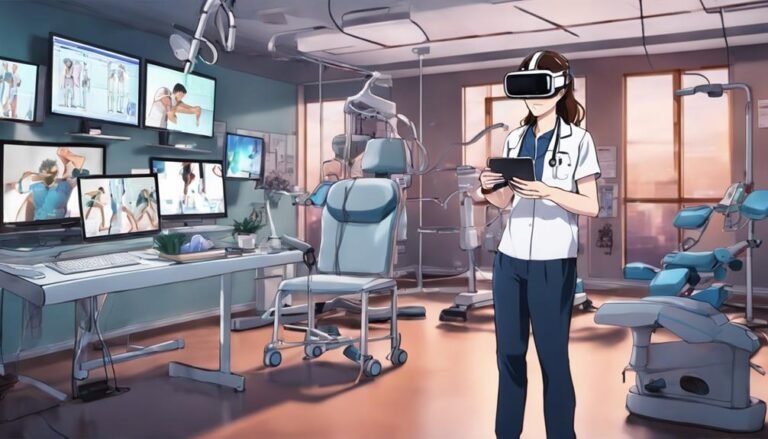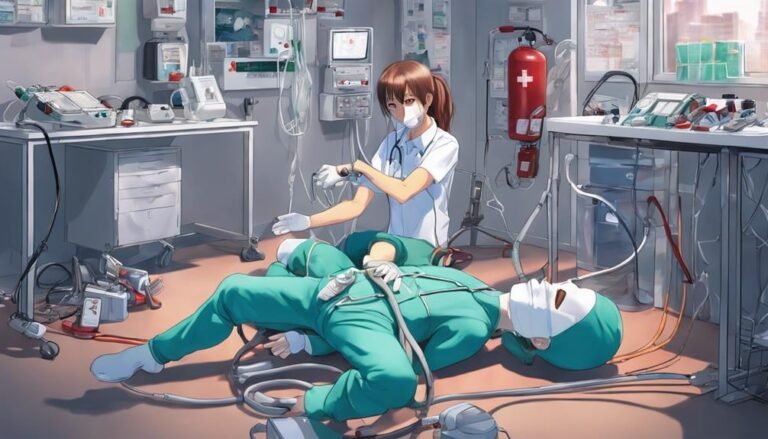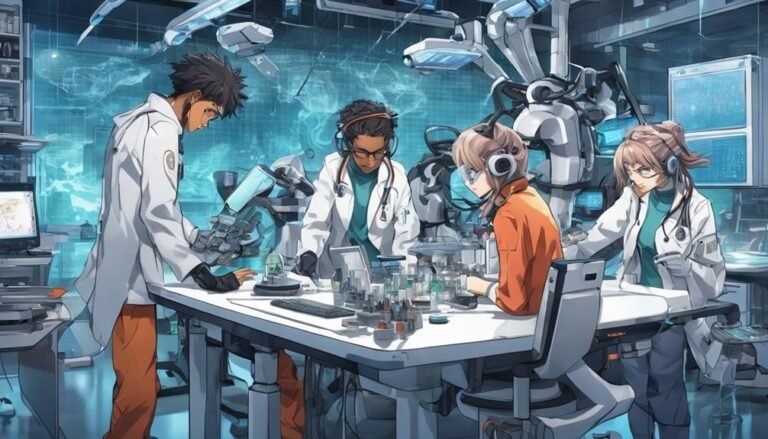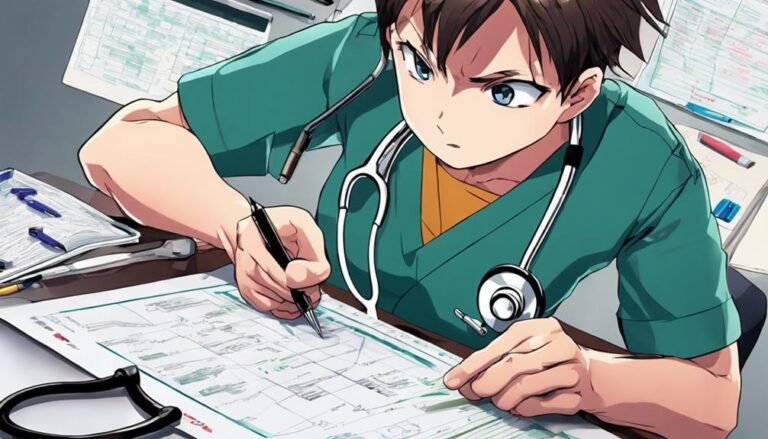How to Be More Effective in Multidisciplinary Teamwork
Imagine you're the master of multitasking, juggling various tasks effortlessly. But when it comes to multidisciplinary teamwork, the game changes.
How can you navigate this complex landscape and emerge victorious? Implementing a few key strategies can make all the difference in how you collaborate and achieve success in diverse team settings.
Let's reveal the secrets to mastering multidisciplinary teamwork and unleashing your team's full potential.
Key Takeaways
- Value diverse strengths for innovative solutions.
- Foster open communication and trust.
- Define clear roles and goals for alignment.
- Embrace flexibility and adaptability for success.
Understanding Team Dynamics
To effectively navigate team dynamics, it's important to understand the unique roles and perspectives each team member brings to the table. Team cohesion is vital for success, and this starts with recognizing and valuing the diverse strengths and expertise within your team. By acknowledging and respecting the different viewpoints and skills present, you can create a collaborative environment where everyone feels heard and appreciated.
Conflict resolution is another key aspect of maintaining team cohesion. When conflicts arise, it's essential to address them promptly and constructively. Encouraging open communication and active listening can help team members express their concerns and work towards mutually beneficial solutions. By approaching conflicts with a problem-solving mindset and a willingness to compromise, you can prevent tensions from escalating and foster a more harmonious team dynamic.
Understanding team dynamics isn't just about recognizing individual contributions but also about how these contributions interact to drive the team towards its goals. By fostering an environment of mutual respect and effective communication, you can enhance team cohesion and navigate conflicts with a positive and productive attitude.
Building Trust and Respect
Building trust and respect within a multidisciplinary team is essential for fostering collaboration and achieving common goals effectively. To build strong relationships and enhance team cohesion, it's important to cultivate an environment of openness and honesty. Encouraging team members to communicate openly about their thoughts, concerns, and ideas can help establish trust. Actively listening to others and showing respect for diverse perspectives also play a significant role in fostering a positive team dynamic.
Acknowledging the expertise and contributions of each team member can further strengthen trust and respect within the group. Recognizing and valuing individual skills and experiences not only boosts morale but also demonstrates a commitment to teamwork. Additionally, being reliable and accountable for your own responsibilities can help instill confidence in your teammates and promote a sense of unity.
Effective Communication Strategies
Developing effective communication strategies is essential for the success of multidisciplinary teams. To foster a collaborative environment and guarantee smooth workflow, consider the following strategies:
- Active Listening: Encourage team members to listen attentively to each other, showing respect and understanding for diverse viewpoints. Active listening promotes empathy and helps avoid misunderstandings.
- Feedback Loops: Establish clear channels for providing and receiving feedback within the team. Regular feedback sessions can enhance communication, address issues promptly, and improve overall team performance.
- Open Communication: Create an environment where team members feel comfortable expressing their thoughts, ideas, and concerns. Encouraging open communication fosters trust and transparency within the team.
- Clarity in Messages: Guarantee that communication is clear and concise to avoid confusion. Use simple language, ask for clarification when needed, and strive to convey information effectively to all team members.
Leveraging Diverse Perspectives
Encourage team members to actively seek out and leverage diverse perspectives to enhance problem-solving and creativity within the multidisciplinary team. By embracing different viewpoints, you open doors to creative problem-solving and innovative solutions. Each team member brings a unique set of experiences, skills, and knowledge to the table, which can be harnessed to tackle complex challenges more effectively.
Consider the following table to see the power of diverse perspectives in action:
| Perspective | Strengths | Contributions |
|---|---|---|
| Technical | Deep understanding of specific areas | Precision in problem analysis |
| Creative | Outside-the-box thinking | Fresh ideas and unconventional solutions |
| Analytical | Strong data interpretation skills | Logical reasoning and evidence-based decisions |
| Strategic | Long-term vision and planning skills | Alignment of actions with overarching goals |
| Communication | Excellent interpersonal skills | Efficient collaboration and idea sharing |
Setting Clear Goals and Roles
To guarantee effective collaboration and productivity in multidisciplinary teamwork, it's essential to establish clear goals and roles from the outset. Setting expectations and defining responsibilities will help your team function smoothly.
Here are four key steps to assist you in setting clear goals and roles:
- Define Specific Objectives: Clearly outline what needs to be accomplished to guarantee everyone is on the same page.
- Assign Clear Responsibilities: Clearly define who's responsible for each task to avoid confusion.
- Set Realistic Timelines: Establish deadlines for each goal to keep the team on track and motivated.
- Encourage Open Communication: Create an environment where team members can openly discuss progress, roadblocks, and adjustments needed.
Resolving Conflicts Constructively
Address conflicts promptly and collaboratively to maintain team harmony and productivity. Conflict resolution is crucial for effective team dynamics. Trust-building and effective communication play key roles in resolving conflicts constructively. When conflicts arise, approach them with an open mind and willingness to understand others' perspectives. Encourage team members to express their concerns openly and listen actively to each other. Seek common ground and focus on finding solutions that benefit the team as a whole.
To resolve conflicts effectively, establish clear communication channels within the team. Promote transparency and honesty in discussions, and guarantee that everyone feels heard and valued. Foster a culture where team members feel comfortable addressing issues early on before they escalate. By addressing conflicts promptly and constructively, you can prevent misunderstandings and foster a positive team environment where everyone feels respected and supported. Remember, conflict resolution is a skill that can be honed through practice and a commitment to working together towards common goals.
Embracing Flexibility and Adaptability
To excel in multidisciplinary teamwork, you must be open to change, capable of quick adjustments to meet evolving needs, and willing to embrace flexibility within your team.
Adapting readily to new situations, being responsive to shifting priorities, and accommodating various perspectives are crucial components of effective collaboration.
Being Open to Change
Embracing flexibility and adaptability is essential for being effective in multidisciplinary teamwork. Being open for change allows you to navigate through the dynamic nature of collaborative projects with ease.
Here are four key ways to cultivate a mindset of flexibility:
- Stay Open-Minded: Be willing for new ideas and approaches that may differ from your initial expectations.
- Adapt Quickly: Embrace unexpected shifts by adjusting your strategies and priorities promptly.
- Seek Feedback: Regularly seek input from team members for incorporate diverse perspectives and improve your adaptability.
- Learn from Challenges: View obstacles as opportunities for growth, allowing you for develop resilience and enhance your flexibility skills.
Quick Adjustment to Needs
Quickly adjusting to the evolving needs of a multidisciplinary team requires a proactive mindset and a willingness to embrace change. To excel in this dynamic environment, focus on quick problem-solving and adaptation strategies.
When faced with shifting requirements, adopt rapid response techniques to address challenges promptly. Embracing flexibility is essential; be open to adjusting plans and roles as needed.
Utilize various flexibility techniques such as being open to different perspectives, adjusting communication styles, and reallocating resources efficiently. Stay agile by continuously evaluating the team's progress and making swift adjustments to optimize performance.
Flexibility in Team
Being flexible and adaptable in a team setting is key to maneuvering the challenges of multidisciplinary collaboration successfully. Embracing flexibility and adaptability fosters a dynamic environment where team members can navigate through various scenarios effectively.
Here are four essential aspects to ponder:
- Open-Mindedness: Stay receptive to new ideas and approaches, acknowledging the diverse perspectives within the team.
- Agility: Be ready to adjust plans and strategies swiftly based on evolving circumstances and feedback.
- Empathy: Understand and ponder your teammates' viewpoints, fostering better team dynamics and collaboration.
- Proactive Communication: Engage in transparent and timely discussions, ensuring effective communication channels are maintained to address issues promptly.
Fostering a Culture of Collaboration
To foster a culture of collaboration within your multidisciplinary team, it's important to open up communication channels to guarantee transparency and information sharing.
Encouraging diverse perspectives allows for a richer pool of ideas and solutions to be explored collectively.
Open Communication Channels
How can you assure that your team fosters a culture of collaboration through open communication channels? To guarantee effective communication within your multidisciplinary team, consider the following strategies:
- Regular Check-ins: Schedule frequent meetings to discuss progress, challenges, and updates.
- Utilize Multiple Platforms: Use various tools like project management software, emails, and instant messaging for seamless communication.
- Encourage Open Dialogue: Create a safe space where team members feel comfortable sharing ideas, feedback, and concerns.
- Active Listening: Practice attentive listening to understand different perspectives fully.
Encourage Diverse Perspectives
Encouraging diverse perspectives in your multidisciplinary team fosters a culture of collaboration that enriches decision-making and innovation. By embracing diversity, you create an environment where team members feel valued and respected for their unique backgrounds, skills, and ideas. This inclusivity encourages creativity to flourish, leading to innovative solutions to complex problems. When individuals from different disciplines come together, they bring a variety of viewpoints that can spark new approaches and strategies. To illustrate the importance of diverse perspectives, consider the following table:
| Benefits of Encouraging Diverse Perspectives |
|---|
| Encourage Creativity |
| Promote Inclusion |
| Drive Innovation |
Incorporating these elements into your teamwork will not only enhance the overall effectiveness of your team but also foster a dynamic and engaging work environment.
Foster Mutual Respect
Fostering mutual respect within your multidisciplinary team is essential for cultivating a culture of collaboration that maximizes productivity and creativity. To achieve this, consider the following:
- Team building: Organize team-building activities to strengthen relationships and create a sense of unity.
- Respectful communication: Promote open and respectful communication among team members to guarantee everyone feels heard and valued.
- Establish norms: Set clear expectations for behavior and communication to promote a respectful environment.
- Address conflicts: Deal with conflicts promptly and constructively, emphasizing understanding and compromise for effective resolution.
Celebrating Achievements and Milestones
To foster a sense of unity and motivation within the team, celebrating achievements and milestones is essential. Milestone recognition and team celebrations not only acknowledge the hard work put in by each team member but also serve as a morale booster.
When achievements are acknowledged through progress parties or small team celebrations, it creates a positive atmosphere within the group. These events act as a reminder of what the team can accomplish together and motivate everyone to aim for more successes in the future.
Continuous Learning and Improvement
Engage in continuous learning and improvement to enhance team effectiveness and stay ahead in a rapidly evolving environment. To achieve this, focus on the following:
- Skill Development: Encourage team members to participate in workshops, online courses, or seminars to enhance their existing skills and acquire new ones. This won't only secure the individual but also contribute to the overall team's capabilities.
- Continuous Improvement: Foster a culture where feedback is welcomed and used to make necessary adjustments. By continuously evaluating processes and outcomes, you can identify areas for improvement and implement changes effectively.
- Knowledge Sharing: Establish platforms or regular meetings where team members can share insights, best practices, and lessons learned. This collaborative approach secures that everyone benefits from the collective knowledge and experiences within the team.
- Adaptability: Embrace change and encourage team members to be adaptable in the face of new challenges. By staying flexible and open to different perspectives, the team can navigate obstacles more effectively and drive continuous growth.
Conclusion
As you navigate the intricate dance of multidisciplinary teamwork, remember that you're all pieces of a beautifully complex puzzle, each unique in its shape and color. Embrace the diversity of perspectives, communicate openly and respectfully, and work towards common goals with trust and flexibility.
Just like a symphony coming together in perfect harmony, your team can achieve greatness when everyone plays their part with dedication and collaboration.
Keep pursuing for excellence, and watch your collective efforts bloom into a masterpiece.







